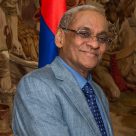
Seetanah Lutchmeenaraidoo
Minister of Foreign Affairs, Regional Integration and International Trade
Economy / Mauritius
“The ocean economy has become a central focus for Mauritius”
Mauritius is remodeling its economy as an ocean-state nation, a strategy that hinges on the Indian Ocean island’s vast potential in the ocean economy, maritime services, and as a trade and investment hub for Africa. Mr. Seetanah Lutchmeenaraidoo, Minister of Foreign Affairs, Regional Integration and International Trade, explains how new trade deals are turning Mauritius into a truly competitive investment platform.
What is the biggest economic roadblock facing Mauritius today?
Mauritius is a middle-income country, which is stuck in the middle-income trap. This means that the level of growth that we had up until few years ago was not sufficient for Mauritius to emerge as a developed country. We had to move beyond our status as a young island lost in the Indian Ocean to emerge as a real ocean state. We are a small island, that is undeniable, but we are also an ocean state that covers 2.3 million square kilometers. This implies that a new strategy for Mauritius should be extended in a way to leverage our ocean-state status to contribute to the development of the region.
How is this new ocean-state economic perspective going to be executed?
The ocean economy has become a central focus for Mauritius, and the port of Mauritius will become like Dubai or Singapore, a maritime hub that will have a cruise quay, a fishing quay, and also a free port. Developing our ocean economy implies developing our port capacities to emerge as maritime hub. An entire industry will derive from this maritime hub. Our fishing quay, for instance, will be 1.2-kilometers long with the ability to host 18 fishing vessels and process seafood for export. Furthermore, we are signing the African Continental Free Trade Area agreement and developing how foreigners can use Mauritius as a stepping-stone to explore and invest into Africa.
Why would investors even need a stepping-stone into Africa?
Africa contains 60% of the world’s natural resources and the world’s youngest population; any investor can no longer ignore Africa today. It has the assets and the potential that others have lost. Yet those investors have one problem: Africa is not easy. It is highly complex in terms of ease of doing business and realizing projects. Africa is not one country but 55 countries, with their own realities. The processes and investment schemes involved are so complex that many investors give up. In this context, Mauritius comes out as a safe beacon, and as a secure destination to draw and safeguard foreign investors’ capital.
In which countries is Mauritius working to ensure more efficient cross-border business?
We are setting up joint commissions in order to ensure that the decisions process is reduced to the minimum. We have such commissions, for example, in Kenya, Ghana, Senegal, Zambia, and we are expanding. In order to represent our region, we work through the Indian Ocean Commission, which gathers Mauritius, Madagascar, Reunion Island, Seychelles and Comoros.
How will the Tripartite Free Trade Area (TFTA) agreement impact trade on the continent?
The TFTA is huge; it combines COMESA, SADC and EAC, and represents a total of 26 countries, with a total population of 700 million consumers. We will have G2G agreements, joint commissions and be project oriented. With Kenya, for instance, we have discussed the development of special economic zones, ICT centers and export processing zones. It is clear that when we come to the joint commissions, we are speaking in terms of billions of dollars of investment that will allow African countries to stand on their feet.
How can Mauritius structure investments safely onto the continent?
Our role in Mauritius is to leverage our know-how and status as safe investment destination, and we use our reliable and efficient financial sector to channel investments. What we give as security no one can give. All projects done under our G2G joint commission schemes materialize as a Special Purpose Vehicle (SPV), a type of set-up that channels funds to the country where they’re managed as an autonomous entity. An SPV can manage up to 50 projects, and each project can have 10 investors. Any investment that goes through the SPV scheme is likely to benefit from incentives, exceptions on custom duties, and from a political risk guarantee. We are dealing at the highest level, which means that investors who go through an SPV know that their projects will go very quickly.
How would you like the global business community to see Mauritius?
Mauritius has one destiny, and it is Africa. We are being accepted more and more as a stepping-stone and investment platform to the African continent. We are in the process of becoming the financial sector, through which investors go through to invest into African countries.
